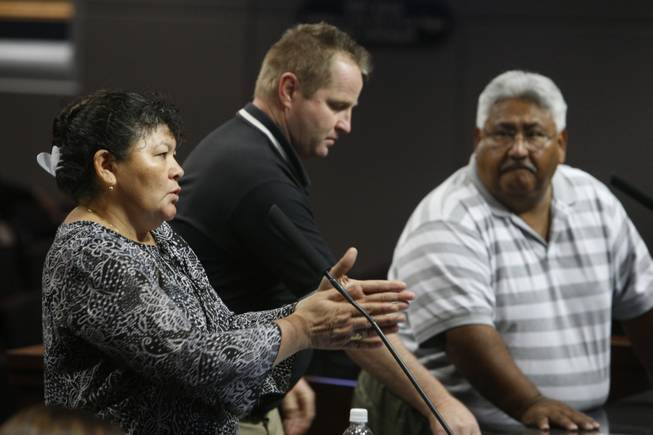
Paz Castillo, left, criticizes Republic Services’ working conditions at a Las Vegas City Council meeting Wednesday. With Castillo are Kevin Hardison, center, Teamsters Las Vegas Local 631 president, and translator Ernesto Castillo (no relation).
Thursday, Aug. 20, 2009 | 2 a.m.
Sun Archives
- Hundreds hit Vegas streets for immigration reform (5-1-2009)
- Think tank: Tough times for Hispanics nationwide (6-11-2008)
- Report: Illegal immigrants contribute billions to state (5-23-2008)
- Immigrants boost economy -- but how much? (4-14-2008)
Elias Garcia and his co-workers were fed up.
They wanted more pay and better benefits for working the line at a Las Vegas recycling plant operated by Republic Services. More important, they wanted safer working conditions. They wanted to organize.
To hear them tell it, workers sorted residential and commercial waste in oppressive heat without proper ventilation and without adequate protection. They say the dust- and chemical-filled air caused them to develop breathing problems and rashes. Some were stuck with needles while sorting waste and allege they had to pay for their own safety equipment.
Workers, pushed to the point of exhaustion, were denied bathroom breaks, they say.
So Garcia opened his house to a Teamsters local.
What happened next, according to labor experts, is typical for a group of workers who have been historically exploited as cheap, replaceable labor.
The recycling employees soon found themselves being summoned to the plant’s head office, where management questioned their immigration status – and threatened termination if they could not provide the proper documents. In a matter of weeks, 30 workers were fired, according to Teamsters Local 631. Most of them were undocumented.
The fired workers are crying foul, saying they were targeted because of their union activity. Many, acknowledging their illegal status, say Republic has employed them for years. Some have been working at the recycling plant for more than a decade. The workers ask the question: Why now?
Republic says it was merely following immigration law.
As a result of its merger with Allied Waste Industries Inc. last year, the company adopted a stricter compliance program and initiated a companywide personnel audit in March, said Bob Coyle, Republic’s vice president of government affairs. The final report, issued last month, found that 23 employees had “questionable documents proving their ability to work legally in the United States,” he said.
All of those employees worked at the recycling plant.
Coyle said the firings had no connection to the Teamsters organizing drive, noting that the union already represents 1,100 of the company’s 1,500 employees. The local has filed an unfair labor practice charge with the National Labor Relations Board on behalf of the dismissed workers.
Labor leaders are also seeking to apply political pressure on the company, which has an exclusive franchise agreement in Southern Nevada. They brought a handful of workers and their families before the Clark County Commission and Las Vegas City Council this week to testify about poor working conditions – accusations Republic calls “absolutely untrue.”
In an interview, Coyle dismissed a list of the workers’ concerns, adding, “I’m surprised they didn’t say the kitchen sink is stopped-up too.” He said workers receive the proper equipment and necessary training. Medical waste, such as needles, is handled at a separate facility, not at the recycling center, Coyle said.
Regardless, the organizing fight is particularly salient in Nevada, which leads the nation in the percentage of illegal immigrants in the workforce. According to the Pew Hispanic Center, more than 12 percent of the state’s workers are undocumented.
Undocumented workers occupy a precarious position in the labor movement. Some see them undermining it because they are often willing to work for less money and under more dangerous conditions than legal residents. Others single out employers for turning a blind eye to immigration law when it bolsters the bottom line.
Labor experts say stories like those being told by the Las Vegas recycling plant workers are common.
“There is an unusual amount of coincidence between workers who seek to organize and employers suddenly becoming concerned with enforcing immigration law,” said Harley Shaiken, a labor and immigration expert at UC Berkeley. “It is clearly a phenomenon out there.”
Cornell University labor expert Kate Bronfenbrenner has found that employers make threats of referral to Immigration Customs and Enforcement in half of the campaigns involving workplaces with a majority of undocumented workers. They make those same threats 41 percent of the time when a shop is majority immigrant.
One of the most famous cases involved the Smithfield pork plant in Tar Heel, N.C., the world’s largest hog slaughterhouse.
Throughout the 1990s the company hired scores of Hispanic immigrants, offering low wages and grueling working conditions that many local residents had rejected. Many, if not most, were undocumented. And, according to the National Labor Relations Board, Smithfield management threatened Hispanic workers with immigration enforcement if they voted for union representation.
Then, with the union stepping up its organizing efforts and the Bush administration initiating workplace immigration raids, the company began demanding valid identification papers from Hispanic employees, ultimately firing some of them.
Undocumented workers, Bronfenbrenner said, are the most vulnerable in an organizing drive for one obvious reason: deportation.
Shaiken said the threats and firings have a chilling effect in the workplace, affecting legal and illegal workers alike. The message to employees is simple: Shut up and work.
“Singling out the most vulnerable makes everyone more vulnerable,” he said.

Join the Discussion:
Check this out for a full explanation of our conversion to the LiveFyre commenting system and instructions on how to sign up for an account.
Full comments policy